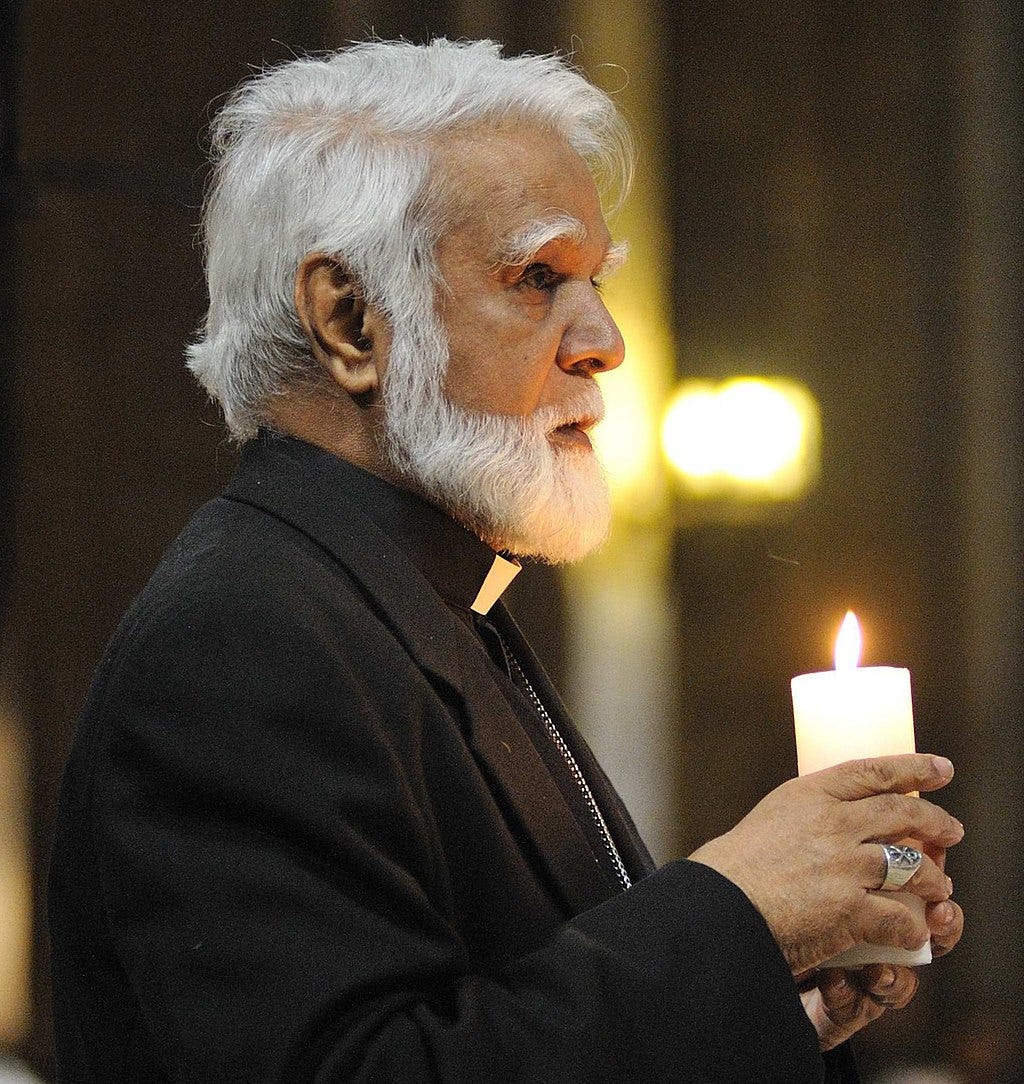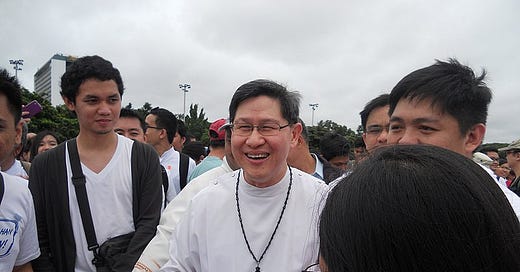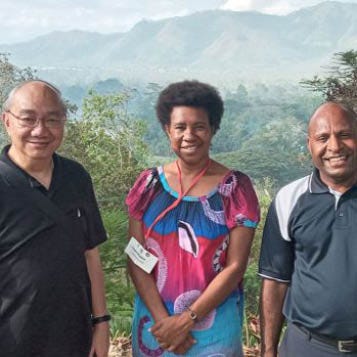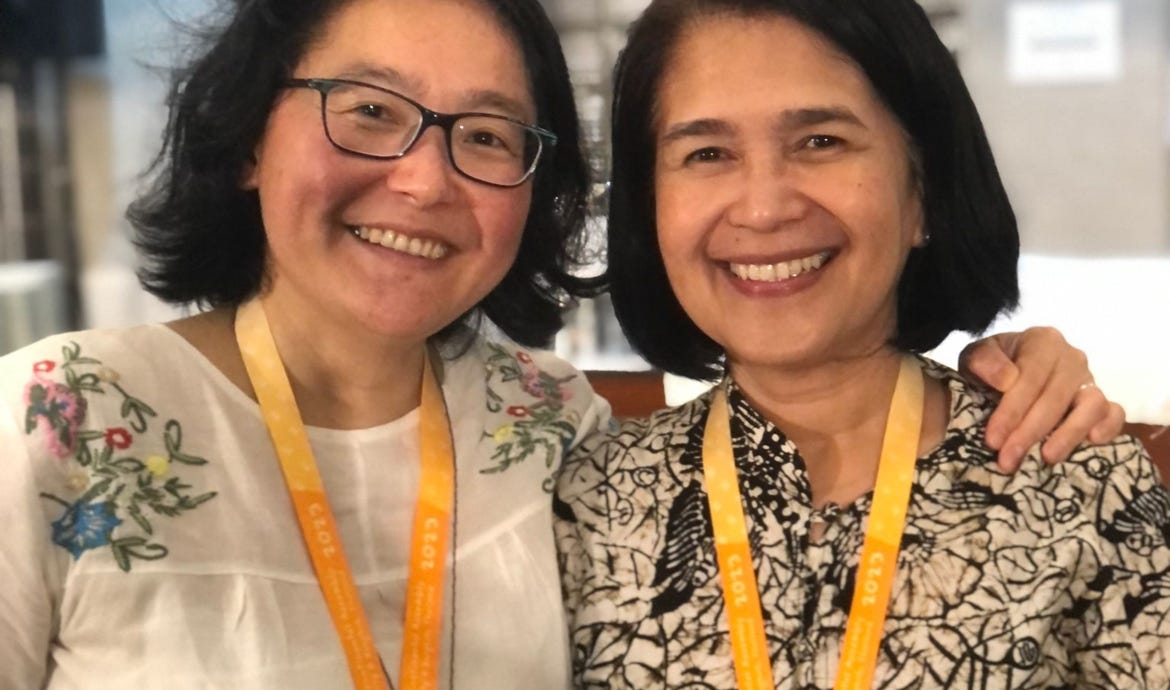Synod on Synodality World Tour: Asia and Oceania, Part II
Synod Participants from Asia and Oceania
This is the fourth in an occasional series exploring the contributions of different parts of the globe to the upcoming Synod on Synodality in October.
Earlier this week, I offered an analysis of the synodal documents drafted by participants in the continental assemblies for Asia and Oceania. The documents drew on images for the Church like “mother,” “bridge-builder,” and “tent of meeting,” and I showed how those images helped shed light on the challenges faced by the Church in those regions.
In today’s essay, I will focus on the participants in October’s Synod of Bishops coming from Asia and Oceania. By my count, there are 70 participants combined from Asia and Oceania, compared to the 80 coming from Latin America and the Caribbean. Other counts may differ, either because I have made mistakes or because some participants could be counted in different ways. As was the case with Latin America and the Caribbean, I was able to identify biographical details for every participant from Asia and Oceania, but again the process was made more difficult because of errors in the spelling of names on the Vatican’s list.
The participants include curial officials, bishops appointed to attend the Synod by their respective national bishops’ conferences, one bishop appointed to the Synod by Pope Francis, and delegates selected from the continental assemblies, as well as a group of non-voting experts.
One thing that stands out among the Synod participants from Asia and Oceania is how many cardinals are included, particularly those from the “class of 2022,” that is, those created as cardinals at the consistory of 2022. That year, Pope Francis appointed six cardinals from Asia, and all six will be present at the Synod. Among the most interesting is Cardinal Giorgio Marengo, I.M.C., the Apostolic Prefect of Ulaanbaatar, in Mongolia, who is representing all of the bishops from Central Asia. An Italian missionary, he came to Mongolia in 2003 and was appointed to his current role as apostolic prefect in 2020. In that role, he has encouraged dialogue between Christianity and Buddhism, the predominant religion in Mongolia. Cardinal Marengo will host Pope Francis when he visits Mongolia later this year.
Cardinal Anthony Poola, the Archbishop of Hyderabad, in India, is among the most inspiring participants in the Synod. Poola is a Dalit, a member of the group formerly referred to as “Untouchables,” those with the lowest social status in India’s traditional caste system. He is the first Dalit to be appointed a cardinal (John Mulagada, who served as Bishop of Eluru from 1977 until his death in 2009, was the first Dalit bishop). Cardinal Poola has dedicated himself to being a “missionary of compassion,” focusing on outreach to the poor and outcast in his archdiocese.
Cardinal William Goh Seng Chye is the Archbishop of Singapore and considered by some to be papabile, that is, a potential contender to be the next pope. Cardinal Goh has been particularly attentive to the changing needs of Asian Catholics amidst the increasing affluence and secularism of some Asian societies. Cardinal Filipe Neri Ferrão is the Archbishop of Goa and Daman, the oldest Latin diocese in India (the Catholic Church in India is divided into three churches: the Latin Church, and then the Eastern Catholic Syro-Malankara Catholic Church and Syro-Malabar Catholic Church), and he is the President of the Latin Conference of Catholic Bishops of India. The style of leadership needed in a more synodal Church will be one of the main topics of conversation in October, and Cardinal Ferrão has called for “synodal leadership” in the church in India. Cardinal Virgilio do Carmo da Silva, S.D.B. is the Archbishop of Dili in the young nation of Timor-Leste (or East Timor). Cardinal do Carmo da Silva has worked with the Timorese government to promote “religious tourism,” or pilgrimages, as a boost to the nation’s economy, and has also spoken out in support of human rights and free elections in the fragile nation.
Cardinal Lazzaro (or Lazarus) You Heung-Sik (the former Bishop of Daejon, in South Korea), will likely play an especially important role at the Synod because of his role as Prefect of the Dicastery for Clergy, the Vatican office responsible for the formation and support of priests. Synodal gatherings around the world have almost universally decried the phenomenon of clericalism. Cardinal You has stated that an alternative vision of the priesthood is needed to combat clericalism:
The priest presides over the community, celebrates for it and with it, the Most Holy Eucharist; he is the father and leader of the community. Jesus also instituted the priesthood for service to the community; therefore, without community, there can be no ministerial priesthood. But the priest is also a child of the community, a companion of the community, in the sense that he walks together with it, eating the same Bread.
He has also suggested that the example of a priest’s life ought to be an even more powerful teaching instrument than his preaching. Cardinal You is close to Pope Francis; the pope wrote the preface to the cardinal’s recent book on Christianity in Asia.
The other Asian cardinal with a role in the Roman Curia is perhaps the most prominent Asian slated to be at the Synod: Cardinal Luis Antonio Tagle, the former Archbishop of Manila in the Philippines, and currently the Pro-Prefect of the Dicastery for Evangelization. He was made a cardinal by Pope Benedict XVI in 2012. Tagle, who has been called the “Asian Francis,” has long been considered perhaps the leading candidate to succeed Pope Francis, although a recent leadership crisis at Caritas Internationalis, which he led from 2015 to 2022, has led some to cast doubts on his chances. Still, as co-head of the Dicastery for Evangelization, Tagle remains the highest ranking official in the Vatican other than the pope; Pope Francis’s re-organization of the Curia, outlined in the apostolic constitution Praedicate Evangelium, made the Dicastery for Evangelization the principal Vatican office, superseding the Dicastery for the Doctrine of the Faith. Tagle is arguably for Pope Francis what Joseph Ratzinger was for Pope John Paul II: a faithful lieutenant and preferred successor.
Tagle is a veteran of synods, having attended the two synods on the family in 2014 and 2015, where he emphasized the plight of families separated by migration. He has also tried to counter fears and concerns regarding synodality. Of interest to theologians, Tagle was, before his ecclesiastical career, a student of the great interpreter of Vatican II, Fr. Joseph Komonchak, at the Catholic University of America in Washington, DC. Komonchak said of Tagle: “He could have become the best theologian in the Philippines, or even in all of Asia, if he had been given the opportunity.” Interestingly, Tagle’s successor as Archbishop of Manila, Cardinal José Advincula, will also be present at the Synod; Advincula, appointed a cardinal in 2020 while Bishop of Capiz and named Archbishop of Manila in 2021, has said he aspires to be a “listening shepherd.”

The other influential cardinal from Asia is Charles Maung Bo, S.D.B., the Archbishop of Yangon, the capital of Myanmar. Bo, who was appointed a cardinal by Pope Francis in 2015, is the President of the Federation of Asian Bishops' Conferences (FABC) and is representing the FABC at the Synod. Cardinal Bo faces a difficult situation in the primarily Buddhist Myanmar, which after years of military dictatorship experienced a decade of fragile liberalization from 2011 to 2021, but this ended with a military coup in 2021, followed by an ongoing civil conflict. Bo has advocated for human rights in the country but recognizes that government pressure makes it hard for the Church to speak with a prophetic voice. Bo has likewise spoken on behalf of the rights of minority ethnic and religious groups in Myanmar, particularly the Muslim Rohingya, which have been subject to violent repression from the government, and he envisions the Church in Asia as a promoter of peace and reconciliation.
Cardinal Francis Xavier Kriengsak Kovitvanit, the Archbishop of Bangkok, Thailand, has praised the Thai government’s peaceful relations with the Catholic Church, in contrast to the situation in neighboring Myanmar. Cardinal Kriengsak has also called for greater participation by the laity in the life of the Church and for them to play a greater role in the Church’s evangelization, important themes at the Synod.
Cardinal Oswald Gracias, the Archbishop of Bombay, represents the old guard among the Asian prelates. A former president of the Catholic Bishops’ Conference of India and later the FABC, he has been a member of Pope Francis’s Council of Cardinal Advisers since it was established in 2013.
The two remaining Asian cardinals who will be present at the Synod are leaders of the Eastern Catholic Churches in India: Cardinal George Alencherry, the Major Archbishop of Ernakulam-Angamaly and head of the Syro-Malabar Catholic Church; and Cardinal Baselios Cleemis, the Major Archbishop of Trivandrum and Catholicos of the Syro-Malankara Catholic Church. The Syro-Malabar Church is also represented by Andrews Thazhath, the Metropolitan Archbishop of Trichur and the President of the Catholic Bishops' Conference of India, and Joseph Pamplany, the Archbishop of Tellicherry. Also present at the Synod will be Fr. Sijeesh Pullankunnel, the Chancellor of the Syro-Malabar Eparchy of Melbourne, which represents the Syro-Malabarese diaspora in Australia, Fiji, and Japan.
In India, the Syro-Malabar Church has been divided by a years-long conflict over the liturgy. After unification with Rome in the sixteenth century, the Church’s East Syriac liturgy became increasingly Latinized; after Vatican II, this included the priest standing versus populum, or toward the people, during the Holy Qurbana (the Syro-Malabarese term for Mass). Church leaders, including the Vatican, however, began advocating for the recovery of practices more authentic to the Indian tradition, including the adoption of the ad orientem posture, in which the priest faces the altar. In 1999, the Syro-Malabar Church adopted a unified liturgy, with the Anaphora (or Eucharistic Prayer) celebrated ad orientem, but other parts celebrated versus populum. A minority of Syro-Malabarese Catholics have not accepted this compromise, however, primarily in some eparchies outside of India, but also among many of the priests in Cardinal Alencherry’s Archdiocese of Ernakulam-Angamaly, leading to a revolt against his leadership. In 2022, opponents even burned effigies of Alenchery and Cardinal Leonardo Sandri, the then-Prefect of the Vatican Congregation for the Eastern Churches. Cardinal Alencherry has also been plagued by accusations of participating in a corrupt real estate deal, although the accusations may have been cooked up by his ecclesial opponents.
The bishops in India have also had to deal with periodic bouts of violence against Christians perpetrated by Hindu nationalists. For example, Cardinal Cleemis and Archbishop Pamplany have spoken out against recent anti-Christian violence in the state of Manipur, on the eastern border with Myanmar. Cardinal Gracias has also lamented violence against Christians. A group of Christian leaders, including Cardinal Alencherry and Cardinal Cleemis, recently met with Prime Minister Narendra Modi seeking assurance that the government would protect the Christian minority from further attack.

One of the major themes for the Synod will be how the church can better reach those on what Pope Francis has referred to as the “peripheries.” Many of the participants from Asia and Oceania have focused their ministries on the indigenous peoples of the two continents. For example, the voting lay delegates from Oceania include John Lochowiak, the Chairperson of the National Aboriginal and Torres Strait Islander Catholic Council, the organization that advises the Australian Bishops’ Conference organization on the pastoral and social needs of Australia’s Aboriginal population. Likewise, Manuel Beazley is the Vicar for Māori for the Diocese of Auckland, in New Zealand, responsible for the pastoral care of the diocese’s Māori population. Beazley has advocated for a “by Māori for Māori approach,” which he associates with walking alongside one another rather than a more paternalistic approach.
Bishop Norbert Pu Ying-hsiung of Chiayi, in Taiwan, is himself a member of the Tsou indigenous group and has encouraged the celebration of indigenous identity in the Church. Bejoy Nicephorus D'Cruze, O.M.I., while he served as Bishop of Sylhet, Bangladesh, primarily worked among the Khasi indigenous group, who made up the majority of Catholics in that diocese. D’Cruze now serves as the Archbishop of Dhaka, the capital, where most Catholics belong to the majority Bengali ethnicity.
The Synod is also set to examine how the Church can better promote the participation of women in the leadership of the Church. This issue has been a matter of debate especially in Australia. Coinciding with the ongoing worldwide synodal process, in 2022 the Australian Church held its Fifth Plenary Council, a gathering of bishops, priests, religious, and lay people, to address the challenges faced by the Church. The council participants voted to approve a motion promoting greater leadership for women in the Church, but the motion was voted down by the bishops, leading to a great deal of consternation. The proposal was revised and broken into smaller motions, all of which were then approved by the bishops.
Timothy Costelloe, S.D.B., the Archbishop of Perth and President of the Australian Bishops’ Conference, who also presided over the Plenary Council, said, “There was never any question about the commitment of everybody [to women’s leadership]. It was more a matter of what that might look like in practice.” Costelloe will be serving as one of the nine Synod presidents. On the other hand, Bishop Shane Mackinlay of Sandhurst, who will also be present at the Synod, admitted that the initial vote was a “terrible look” for the bishops. Dr. Renée Köhler-Ryan, National Head of the School of Philosophy & Theology and a voting lay delegate at the Synod, was also a participant at the Australian Plenary Council who helped author the revised proposals calling for greater women’s leadership. Although not all participants at the Plenary Council shared her view, Köhler-Ryan opposes the ordination of women to the priesthood.
Speaking of women’s leadership, the Synod delegations from Asia and Oceania feature a number of exceptional women religious. Momoko Nishimura, S.E.M.D., is a member of the Servants of the Gospel of God's Mercy—a community of consecrated religious, priests, and lay members established in 2002—engaged in youth ministry in Yokohama, Japan. She was appointed by Pope Francis to be one of the nine presidents of the Synod (the only one from Asia). She had been engaged in ministry in Argentina during the time when Jorge Mario Bergoglio was the Archbishop of Buenos Aires, and she was the official Japanese translator of Francis’s 2020 encyclical Fratelli Tutti. Sr. Nishimura was also part of the team that drafted the Asian continental document and was a facilitator at the meeting of the FABC that reviewed the document.
Also from Japan, Sr. Philomena Shizue Hirota, M.M.B. is a member of the Mercedarian Missionaries of Berriz and a consultant for the Catholic Council for Justice and Peace of the Japanese bishops’ conference. She is involved with the Talitha Kum Japan organization which combats human trafficking. She is also an expert adviser on the synodal process for the Vatican.
Maria Nirmalini, A.C. is the Superior General of the Apostolic Carmel and is a delegate to the Synod representing religious superiors. She is also the President of the Conference of Religious India. In that role, she has encouraged women religious in India to take a more activist stance regarding important issues, including the status of women in Indian society and violence against women, in contrast to the more cautious approach taken by the bishops in that country.
The other delegate from Asia and Oceania representing religious superiors is Mark Hilton, S.C., the Superior General of the Brothers of the Sacred Heart. Originally from Australia, when the Brothers left that country in 1998, he moved to the United States where he became a high school principal. From 2014 to 2018, he was the U.S. provincial for the order. Fr. William LaRousse, M.M., a Maryknoll priest stationed in Thailand, is the assistant secretary of the FABC. Fr. Asaeli Raass, S.V.D. from Fiji is the Provincial of the Divine Word Missionaries for the Australia province, which also includes New Zealand, Thailand, and Myanmar. He served as a co-facilitator for the Oceania Continental Assembly. Br. Ian Cribb, S.J. is the Provincial Delegate for Jesuit and Ignatian Spirituality, Australia, a center that offers retreats and promotes Ignatian spirituality. Br. Cribb was a facilitator for the spiritual conversation method in the Oceania region. Both Fr. Raass and Br. Cribb will be non-voting expert advisers at the Synod.
There are also lay ecclesial leaders representing Asia and Oceania, although not as many as from Latin America and the Caribbean. Kelly Paget is the Chancellor of the Diocese of Broken Bay in Australia serving as a voting delegate. Grace Wrakia, another voting delegate, is the National Coordinator of the Lasallian Family in Papua New Guinea and was part of the team that drafted the Oceania continental document. Dr. Susan Pascoe is a non-voting adviser from Australia who serves on the Vatican’s synodal preparatory commission. Heavily involved in the nonprofit world, she is the Board President of Australian Council for International Development and was formerly the Commissioner of the Australian Charities and Not-for-profits Commission, a government regulatory agency. Anna Teresa Peter Amandus, a voting delegate from Malaysia, is the Chair of Caritas in the Diocese of Sandakan and the administrator of that diocese’s pastoral office. She represented Malaysia at the Asian Continental Assembly. Rosalia Minus Cho Cho Tin was likewise a delegate for Myanmar at that assembly, although I could not find any further details about her work.
Of course, in a newsletter for theologians, I can’t forget to include the theologians from Asia and Oceania. Perhaps the most well-known in the United States is the Australian theologian Fr. Ormond Rush, a professor of religion and theology at the Australian Catholic University and a past president of the Australian Catholic Theological Association, who is serving as a non-voting expert. Fr. Rush’s work focuses on the interpretation of Vatican II and the concept of the sensus fidelium, or the “sense of the faithful.” Among his recent works is The Vision of Vatican II: Its Fundamental Principles (Liturigcal Press, 2019). Dr. Sandie Cornish also teaches at the Australian Catholic University, and previously was the Director of the Office for Justice, Ecology and Peace of the Australian Catholic Bishops Conference. She is an expert on Catholic social teaching, and her various writings apply it to issues facing Australian society. She is a member of the Vatican’s Dicastery for Integral Human Development, and she advised the Continental Assembly of Oceania.
Some readers may also know of Vimal Tirimanna from Sri Lanka, a professor of moral theology at the Pontifical Alphonsian Academy (the Alfonsiana) in Rome. His work focuses on the themes of inculturation and contextualizing theology, and he is serving as a theological adviser for the Vatican’s preparatory commision for the Synod. Dr. Estela Padilla from the Philippines is the Executive Secretary of the Office of Theological Concerns for the FABC. She was a member of the team that drafted the Asian continental document and has experience working with base ecclesial communities in the Philippines, an important avenue for lay leadership and ministry. Fr. Clarence Devadass is a Malaysian theologian and the Director of the Catholic Research Centre in Kuala Lumpur. Dr. Vanessa, or Vania, Cheng Siu Wai is a professor of ecclesiology at Holy Spirit Seminary and College in Hong Kong and was a delegate at the Asian Continental Assembly. Dr. Renée Köhler-Ryan, already mentioned, is a philosopher who studied under the great Catholic metaphysician William Desmond; in her work, she is an interpreter of Desmond, and also writes on metaphysics and aesthetics. She was on the team that wrote the Oceania continental document.
Dr. Trudy Dantis is the Director of the Australian Catholic Bishops Conference’s National Centre for Pastoral Research, an organization that conducts sociological studies to inform the Church’s pastoral efforts. Dr. Dantis’s work focuses on using research to help build stronger parishes. Dr. Christina Kheng, from Singapore, is a professor of pastoral leadership at the East Asian Pastoral Institute in Manila and a theological adviser to the Vatican’s Synod preparatory commission.
Anthony Fisher, O.P., the Archbishop of Sydney, is also an accomplished philosopher and theologian, whose work has focused on bioethics. Before being appointed the Auxiliary Bishop of Sydney in 2003, he lectured at the Australian Catholic University and was the founding director of the Pope John Paul II Institute for Marriage and the Family in Melbourne, which later closed in 2018. Fisher is considered a protégé of his predecessor in Sydney, the late Cardinal George Pell, and he has been called “Pell with a smile.”
Several of the delegates from Asia and Oceania are involved in education. Fr. Joel Casimiro Da Costa Pinto, O.F.M., who represented Timor-Leste at the Asian Continental Assembly, is the Rector at the Universidade Católica Timorense. Dr. Susan Sela, who was on the team that drafted the Oceania continental document, is the Director of Technical and Further Education at the University of the South Pacific. Sr. Lalitha Thomas, S.J.T., a member of the Sisters of St. Joseph of Tarbes, is the Principal of Jyoti Nivas College for women in Bangalore, India, which is run by her order, and the Director of the school’s Post Graduate Centre. Sr. Mary Angela Perez, R.S.M., a Sister of Mercy, is the Director of Mission Effectiveness at the Academy of Our Lady of Guam high school, where she previously served as principal. She is also involved in advocating for the rights of migrants. I think the surprisingly large number of educators reflects the emphasis placed on young people in the Asian and Oceania documents; as I noted earlier this week, both are young continents, but both documents recognize that the Church has failed to adequately include and engage this population.
Surprisingly, aside from the two Synod presidents (Archbishop Costelloe from Perth and Sr. Momoko Nishimura, S.E.M.D. from Japan), the only delegate from Asia or Oceania personally selected by Pope Francis is Stephen Chow Sau-yan, S.J., the Bishop of Hong Kong, who is slated to become a cardinal in September. He recently traveled to Beijing to meet with representatives of the Chinese government, and he sees himself as a bridge-builder between the Church, the West, and China. As I noted earlier this week, the Asian continental document identifies “bridge-building” as an important task for the Church. Bishop Chow has also played a mediating role in Hong Kong, between the government and anti-government protestors, and as a protector of the city’s Christians.

Other participants in the Synod could also be considered bridge-builders. For example, Cardinal Joseph Coutts, the retired Archbishop of Karachi, Pakistan, was an important voice for Christian-Muslim dialogue, but also spoke out against the country’s blasphemy laws. Tarcisio Isao Kikuchi, S.V.D., the Archbishop of Tokyo, called for Japan to play the role of peacemaker when tensions were rising between the United States and North Korea in 2017, and he likewise condemned political violence after the assassination of former prime minister Shinzo Abe in 2022. Enrique Alvargonzalez, S.J., a missionary from Spain and the Apostolic Prefect of Battambang, Cambodia, is known as the “Bishop of Wheelchairs” because of his work on behalf of the victims of land mines in that country. He has also advocated for greater inculturation in the life of the Church: “We have had a lot of inculturation in liturgy. People use Cambodian ways to sit down, to respect God. We have a localized liturgy and it’s very beautiful.”
I think that is a good note on which to close. Many of the Synod participants coming from Asia and Oceania have adopted local ways to speak with and worship God. They are finding an authentic way to live out the faith in the Asian and Pacific contexts. They also have experience as peacemakers, advocates, and dialogue partners. They bring a wealth of theological and pastoral wisdom.






